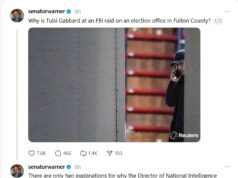In the present fraught moment — with the Democrats hesitating in dealing with by far the most impeachable President America has ever had — an increasing number of people have been expressing concern over the failure of the Democrats to show the same all-out determination as this lawless President. (E.g. all the MSNBC hosts that I follow – Chris Hayes and Rachel Maddow especially — have been expressing increasing concern about this apparent weakness.)
I recognize that even now, not everyone agrees with the idea that the liberal/Democratic side of American politics is showing weakness, much less that – as I maintain — this weakness has been a habitual problem for a generation. And it gives me no pleasure to antagonize those good people with whom I share so many values and hopes for a better America
But for me, there’s no question about it. I’ve been observing — and commenting on — weakness on the Democratic side since at least the early 80s. To me, that problem is all too clear—and has been for me a source of all too much frustration and disappointment over a very long time.
(And sometimes despair, as it has repeatedly enabled the Republican Party to become ever more destructive while yet succeeding in the battle for power.)
So over that same time, more than thirty years, I’ve given thought to the question: Where does that weakness come from? And I’ve had a few ideas which I’d like to share here for those who accept the premise that there is some Democratic weakness to be explained.
I.
When I first noticed something getting weak, it appeared to me to be connected with a loss of liberal confidence in the efficacy of their ideas for making a better America. It had become less clear than it had previously been that the liberal solutions being applied (e.g. “The War on Poverty”) were working as hoped.
In the wake of FDR’s New Deal, and Truman’s GI Bill of Rights, and Johnson’s civil rights legislation and Medicare, liberalism – with its sense of the possibility of social progress — was riding high. But by the time Walter Mondale was running against Ronald Reagan in 1984, it seemed to me that one could discern an uncertainty on the liberal side regarding their ideas on how to move America forward.
It was then that conservative views became ascendant — a big change from the post New Deal era – an ascendancy that seemed to last through the Clinton Presidency. (People started calling the GOP the “Party of ideas,” if you can imagine that. Actually they did have a few ideas —Obamacare is, basically, one of them.) And a big chunk of the American people gave some credit to Reagan’s line about “government” being “the problem.”
And, liberals became less bold. More stuck in playing defense, trying to minimize losses.
II.
Another source of the weakening of the Democratic political force goes back still further: to the time of conflict in the Democratic world over the war in Vietnam.
It was a Democratic President who’d gotten the United States deeply mired in that mistaken war. And it was likewise on the Democratic side that an anti-war movement took hold. In that intraparty battle, the anti-war side campaigned against that Democratic President (LBJ) in an effort to elect a different Democratic leader who’d get us out of the Vietnam morass. The “doves” on Vietnam looked to Senator Eugene McCarthy of Minnesota, Robert Kennedy (brother of the slain JFK), and then in 1972 actually got a presidential nominee in George McGovern.
The triumph of the doves in the Democratic Party left another more hawkish faction – sometimes called the “Scoop Jackson” faction, for the more hawkish Senator from Washington state – on the sidelines. The party was split, and the dovish spirit was dominant.
McGovern was a wonderful human being. (He also lost catastrophically to the not-yet-exposed “crook,” Richard Nixon.)
I don’t know if McGovern would have made a good President, or not, but in 1976 the Democrats did manage to elect another very fine man, Jimmy Carter, to the presidency.
In the history of Carter’s presidency, we can find some evidence suggestive of that Democratic weakness. Specifically, Carter proved terribly inept at struggles over power on the global stage. Still more specifically, Jimmy Carter – the only Democratic President between LBJ and Bill Clinton – completely blew it on handling the Iranian hostage crisis. Blew it in a way that, in retrospect, can be seeing as revealing some of the same kind of weakness we’ve seen from Democrats since.*
(That failure in an important battle – with Khomeini’s revolutionaries in Iran – was one of the main factors that enabled what was then a pretty extreme right-wing Republican – Ronald Reagan – to win the presidency in 1980.)
I believe that the Democrats’ fracture over Vietnam helped create a party animated by a non-combative spirit.
The hawkish element of the Democratic Party had discredited itself with its bad judgment and misconduct in the Vietnam debacle. The Party’s rejection of that discredited hawkish spirit transferred power in the party to the people under the sway of a dovish spirit that had arisen because of the Vietnam disaster, but then tended to bleed out from the Vietnam question to a more general lack of spirit for toughness in combat, even for fights that were not warfare, even for fights that needed to be fought.
(As a young man, I’d entertained high hopes that the nation would learn “the lessons of Vietnam.” Everyone did contend in some way with that traumatic experience. But I never saw much evidence on either the right or the left that much wisdom had in fact been gained.)
III.
And one more element in this is how the Democrats lost the South (white southerners) to the Republicans as a result of the Democrats’ passing the civil rights legislation of the 60s. LBJ declared privately, as he signed that legislation, that the Democrats would be losing the south for a generation. Well, we’re at two generations and counting.
The South had been an important component of the Democratic coalition since before the Civil War. It was the Democratic Party that was the main political instrument of the slaveholders throughout the decades leading up to that conflict over slavery. And when the South had lost the Civil War and rejoined the union, instituting a white supremacist and segregationist regime of Jim Crow on the region, the Democratic Party had remained the political home of that dominant, white, racist part of the southern political culture. White Southerners voted for Democrats, while blacks were largely disenfranchised, and if they could vote they’d have voted for “the Party of Lincoln.”
But all that began to change after LBJ alienated those people by requiring that segregation be abandoned, that “separate but Equal” would no longer be tolerated as a fig-leaf over the reality of consigning a whole race of people in the American South to second class citizenship just because of their race.
Nixon’s “Southern Strategy” in 1968 marked an early part of that partisan switch of Southern whites. By the turn of the millennium, the Democratic “Solid South” had become the Republican “Solid South.”
The loss of white Southerners is relevant to the problem of Democratic weakness, I believe, because Southern white culture – for better and for worse — has historically been America’s most military-oriented, most combative component. (See Bertram Wyatt-Brown, Southern Honor: Ethics and Behavior in the Old South.) The enculturation of a warrior ethos in the white South has been clear from well before the Civil War to the present day.
So it makes sense that the departure of the white South from the Democratic coalition would leave the party with a diminished readiness to fight. Take away the lion’s share of the warrior spirit and one is left with a spirit that’s not all that ready and willing to fight.
These are the main lines of explanation that I’ve come up with over the past several decades as I’ve watched the devolution of our politics. (These plus what might be called a “spiritual” weakening deriving from aspects of what might be called the secular, liberal worldview– which is explored at some length in my 2015 book WHAT WE’RE UP AGAINST.)
America’s once healthy governmental system has been completely debased by a Republican Party that makes a fight over everything (because it is animated by a spirit that’s all about spreading brokenness throughout our world) and that debasement has been enabled by a Democratic Party that shrinks from fighting over anything, even when the nation has needed for them to stand and fight their ever-more-destructive Republican counterparts.
The grotesqueness of the Trump presidency has done much to arouse the spirit of the Democratic Party, from the base to our elected leaders.
But old habits die hard. And it is imperative and urgent that we overcome that weakness now to save our American democracy from a Republican Party that has by now given itself so far over to “evil” that they routinely do the unthinkable: giving us a President Trump and continuing to support him even as he makes war on everything good in America, including the constitutional order.
Really, really time to stand and fight now.
************************
NOTE: I wrote then, during the Iranian hostage crisis – in considerable distress — about how Carter blundered by talking about the hostages in a way that inflated their importance. That handed power to his adversaries, the Iranian revolutionaries. President Carter really should have read O’Henry’s story, “The Ransom of Red Chief” for some idea of how to play the confrontation with the Iranian revolutionaries who’d seized dozens of Americans hostage in Tehran when Khomeini replaced the Shah.


![[UPDATED 1/29/26] Audio: Sen. Tim Kaine Talks to Blue Virginia About His “Five-Point Plan” to Fight Trump’s Orban-Like Assault on US Democracy; Civil Disobedience a la MLK Jr.; Trump’s Bogus “Energy Emergency”; the Crucial Importance of the 2025 VA Elections; etc.](https://bluevirginia.us/wp-content/uploads/2025/02/kaineinterview2-238x178.jpg)







![[UPDATED 1/29/26] Audio: Sen. Tim Kaine Talks to Blue Virginia About His “Five-Point Plan” to Fight Trump’s Orban-Like Assault on US Democracy; Civil Disobedience a la MLK Jr.; Trump’s Bogus “Energy Emergency”; the Crucial Importance of the 2025 VA Elections; etc.](https://bluevirginia.us/wp-content/uploads/2025/02/kaineinterview2-100x75.jpg)
